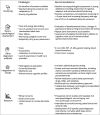Dementia in Rare Genetic Neurodevelopmental Disorders: A Systematic Literature Review
- PMID: 38759134
- PMCID: PMC11175636
- DOI: 10.1212/WNL.0000000000209413
Dementia in Rare Genetic Neurodevelopmental Disorders: A Systematic Literature Review
Abstract
Background and objectives: Knowledge of young-onset Alzheimer disease in adults with Down syndrome has greatly improved clinical care. However, little is known about dementia in rare genetic neurodevelopmental disorders (RGNDs). In this review, a comprehensive overview is provided of reports on dementia and cognitive/adaptive trajectories in adults with RGNDs.
Methods: A systematic literature review was conducted in Embase, Medline ALL, and PsycINFO on December 6, 2022. The protocol was registered in PROSPERO (CRD42021223041). Search terms for dementia, cognitive and adaptive functioning, and RGNDs were combined using generic terms and the Orphanet database. Study characteristics and descriptive data on genetic diagnosis, clinical and neuropathologic features, comorbidities, and diagnostic methods were extracted using a modified version of the Cochrane Data Extraction Template.
Results: The literature search yielded 40 publications (17 cohorts, 23 case studies) describing dementia and/or cognitive or adaptive trajectories in adults with 14 different RGNDs. Dementia was reported in 49 individuals (5 cohorts, 20 cases) with a mean age at onset of 44.4 years. Diagnostics were not disclosed for half of the reported individuals (n = 25/49, 51.0%). A total of 44 different psychodiagnostic instruments were used. MRI was the most reported additional investigation (n = 12/49, 24.5%). Comorbid disorders most frequently associated with cognitive/adaptive decline were epilepsy, psychotic disorders, and movement disorders.
Discussion: Currently available literature shows limited information on aging in RGNDs, with relatively many reports of young-onset dementia. Longitudinal data may provide insights into converging neurodevelopmental degenerative pathways. We provide recommendations to optimize dementia screening, diagnosis, and research.
Conflict of interest statement
A.M. Van Eeghen, L.W. Ten Hoopen, and M.Y. De Wit are members of the European Reference Network for Rare Malformation Syndromes, Intellectual and Other Neurodevelopmental Disorders (ERN-ITHACA). (EU Framework Partnership Agreement ID: 3HP-HP-FPA ERN-01-2016/739516). Go to
Figures




References
Publication types
MeSH terms
LinkOut - more resources
Full Text Sources
Medical
